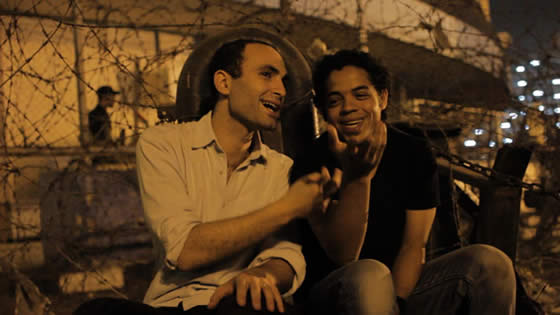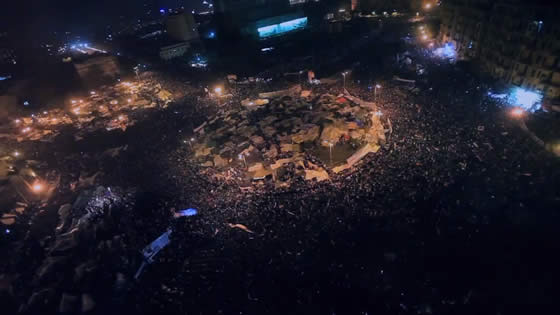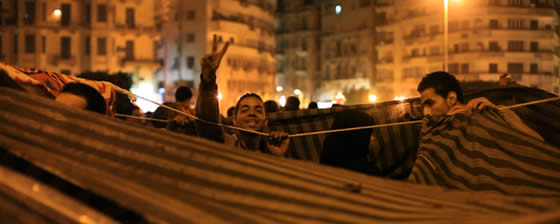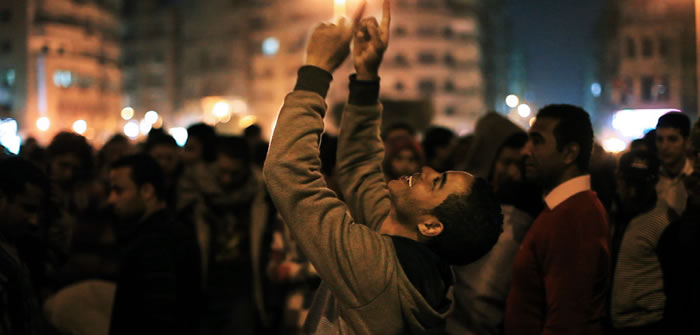THE SQUARE captures the immediacy and intensity of the revolution from the nexus of Cairo’s Tahrir Square, catapulting us into the action from the 2011 overthrow of Hosni Mubarak, through military rule, and culminating with the ousting of Mohamed Morsi in the summer of 2013. The film provides a kaleidoscopic, visceral portrait of the events as they unfold through the eyes of several passionate activists—including one member of the Muslim Brotherhood and a young liberal, Khalid Abdalla, who has acted in films like THE KITE RUNNER. Armed with nothing more than cameras, social media, videos posted to YouTube, and a resolute determination to liberate their nation, these revolutionaries give us a first-hand view of a struggle fought with new weapons.
THE SQUARE was first shown as a work-in-progress at the Sundance Festival in January of this 2013.
In its partnership with Human Rights Watch Film Festival, MUBI is now showing THE SQUARE for thirty days.
Bijan Tehrani: What originally encouraged you to make “The Square”?
Jehane Noujaim: Well I make films about moments and people that I feel should be shared with the entire world—or as many people that I can share it with—and usually that happens when I am inspired surprised and I feel like I am learning something. So, I live about 10 minutes away from Tahrir Square in Egypt—my family lives there—so as soon as things were erupting in Egypt, I went back to be in “the square” and all around me I found people yelling, crying about their kids and grandkids, screaming, “It’s better if you just take me!” And it was a very inspiring time to be with people that were putting their whole lives on the line for their country. I wanted to be able to share that with people because in the United States we feel very disconnected with from any kind of ability to change our country these days. I marched against the Iraq war; nothing happened, and so I found it an incredible experience to be sitting in the square and being with people—men, women, Christian women, all different classes—fighting for a better future and people who were giving their lives for that, so I wanted to be able to share that.
I also wanted to be able to show a country going through such change. I grew up in Egypt when it was very difficult to talk about politics to a stranger in the street, and in January 2011 people were talking about their country and the political future and they were not scared anymore at that point in time. I found that to be very inspiring, and I wanted to be able to share that story for people who have not experienced revolution. I make my films as close to a fiction films as possible, visually. So no interviews; I use small cameras to put the audience in the center of the action so that people can feel a small glimpse of what it feels like to be in the middle of this, and to understand the process it takes, and to understand that sometimes the loneliest and darkest moments are some of the most important moments because you never see Gandhi and Martin Luther King when they have lost hope and all of their friends have abandoned them. So following this film over two and a half years, you see that it is like a wave and it is a process. You can’t determine the success or failure over one or two events, you have to see and watch as our characters feel lonely and feel like they have lost, and the big telling moment is the next day when they come back to the square and they keep fighting, and that is even more important than the most successful moment.
BT: It is so interesting to be able to see that, first hand. I witnessed the Iranian revolution, regardless of what happened after that, but it is so fascinating to witness history being made right in front of you. What was it like for you during this time?
JN: The Iranians must have been watching Egypt as if it were a car crash that was about to happen! You must have been watching this saying “Don’t do this!”
 When you know you are actually experiencing history and experiencing change, especially when the news cameras have left, I think you know it because you actually see profound change with people around you, and the profound questioning of everything that they stand for. Revolution is not only something that is happening on the outside on the ground, it was happening inside the people that were taking part in it, and that included me. I feel like my whole understanding of what’s possible in the world was changed in the last few years, that not only changes your feeling about what is possible in the political sense, but it also affects your feelings on what is possible in your personal life and your job and in things with your family, so that was a very interesting process to go through.
When you know you are actually experiencing history and experiencing change, especially when the news cameras have left, I think you know it because you actually see profound change with people around you, and the profound questioning of everything that they stand for. Revolution is not only something that is happening on the outside on the ground, it was happening inside the people that were taking part in it, and that included me. I feel like my whole understanding of what’s possible in the world was changed in the last few years, that not only changes your feeling about what is possible in the political sense, but it also affects your feelings on what is possible in your personal life and your job and in things with your family, so that was a very interesting process to go through.
BT: How did you come up with the visual style and structure of your film?
JN: Well it was very collaborative process. The entire crew that shot the film met each other in the square. I met the DP and I met Cressida True, who is one of the other filmmakers, so we had about four cameras in the square over the past 2- 3 years, and we followed the characters because we wanted to tell an emotional story, not just a news story—an emotional story of people and what people got through to achieve massive change, and to see their ups and downs.
We focused on about six characters to begin with, and in the end there are about three main characters in the film. So there is the filming aspect of it where everybody was filming everything they could, not really knowing at the time what would be useful or what would be crucial for the film, and there were about four main people filming. 30% of the footage in the film was shot by the main character in the film and Muhammad Hamdy, who was our DP, and Cressida True shot the rest. We shot about 1,600 hours and then came the process of editing it and figuring out how we would tell the story. This involved combining the most important moments of the characters’ emotional journeys, plus the most important moments in the revolution through “The Square”. We weren’t just filming a revolution, we were making a film through the eyes of these characters in the square and how the square was used. This was very interesting to me because there are squares everywhere in the world, so this concept of taking over a square and demanding your rights no matter where that square is, is sort of a universal concept.
I feel like you have to fall in love with your characters in order to really tell who they really are. If you are spending 3 years of your life with a character and then you are spending time editing them, and then you spend time watching them in the movie theatre, well then you have to like them. So Ahmed, for example, was a very charismatic guy and you see him grow through the film, and you just want to experience the revolution through his eyes; he became somebody that you wanted to follow. Our Muslim brotherhood character was very conflicted because he has his allegiances to the secular revolutionaries, who he started the revolution with and he was also supported by financially for many year, pulled him in that direction, so his story is an interesting one to watch. Khalid is somebody who we found fascinating because he could have been anywhere else in the world at that time, somebody who grew up because his father and grandfather fought politically in Egypt and his father was an exile, so he grew up in the UK. He is also a famous actor and he was in the film the Kite Runner, so he could have been continuing his acting career, but he left all that in order to be in Egypt during this time. He was very articulate about what was happening and, at times, he had a great clarity and an understanding about the hectic events taking place.
Revolution is not a clear cut story; it is confusing and blurry and that is also a part of the story—you don’t know. People are living in the moment and you are not sure what is coming next, so you had to be there for two-and-a-half years and record everything.
BT: Are you planning to make a follow up film to what is going on right now in Egypt?
JN: We are definitely going to be doing updates, so we are going to be uploading updates for the film but we are not going to be changing the film. We have a couple of other ideas for follow-up films to do actually. One is where we film inside all three presidential campaigns, and we are working on putting that together.

